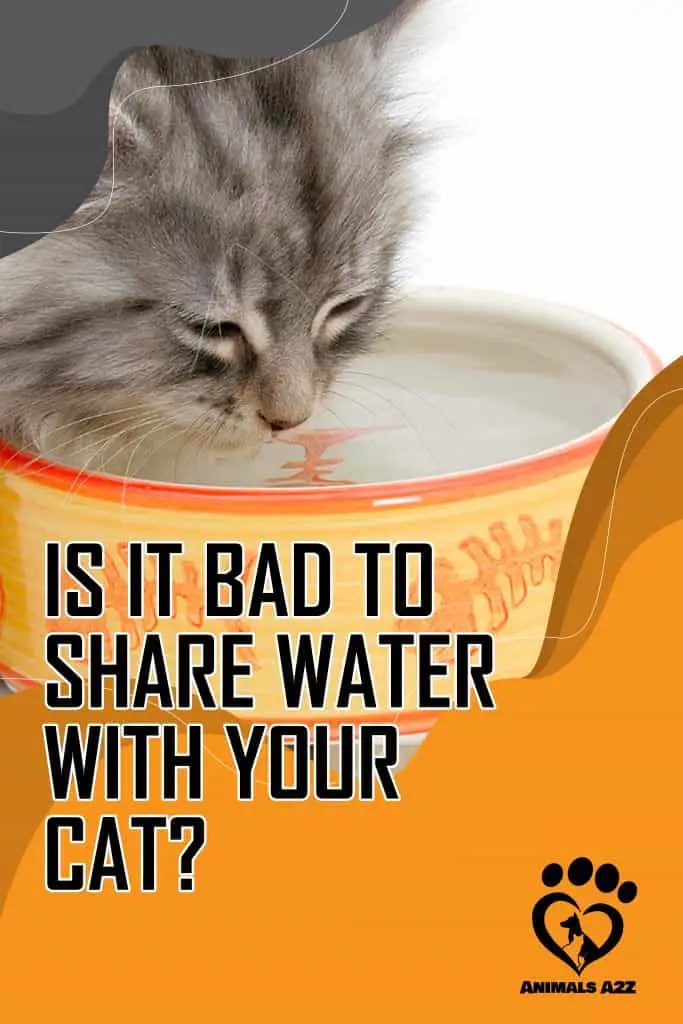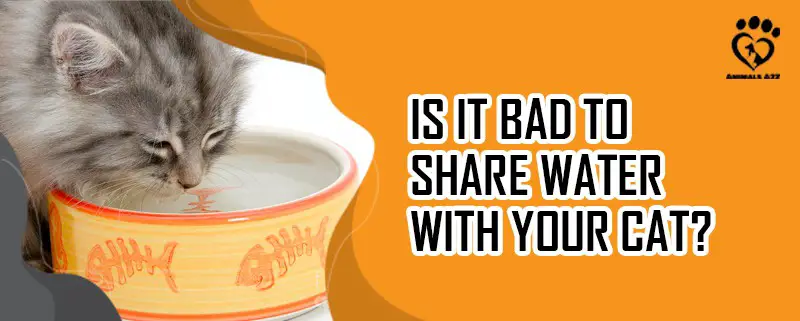Asking whether you can share clean water with your cat is like asking if you can lend a good friend water to drink from the same glass as you. It might be okay, but it’s not a good idea.
You shouldn’t share drinking water using the same glass or water container with your cat. However, you can share your water with your cat if you pour it in a different water bowl.
Table of Contents
Common myths about cats’ mouths
As owners, we tend to easily believe things regarding our cats, especially if they are fascinating. Sometimes, we don’t even bother debunking it for our safety and of our cat. When it comes to our lovely pets’ mouths, there are a couple common misconceptions.
Taking a look at these myths, might help you decide whether to let your cat lick or drink from your water cup.
Cats’ mouths are cleaner than our mouths
Unless you take care of your pet’s mouth the same way you take care of your own, it won’t be as clean. Hopefully you brush your teeth and floss every day, but you are unlikely to be treating your cat’s mouth with the same level of care.
Due to infrequent brushing, cats usually have a much higher level of bacteria than humans do. Proper oral care and dental check-ups are two of the most important things that you can do to ensure that your cat’s mouth isn’t as dirty as a toilet.
Cat saliva has healing properties for wounds
Although you may have seen your cat licking its own wounds, it’s not a good idea to let them lick yours. The bacteria in your cat’s dirty mouth could lead to infection at the wound sight. The best thing that you can do for a wound is to clean it with water and soap. The only way our pets can help with our healing is by constant cuddles and their love.
The truth about a cat’s mouth
A cat’s mouth is prone to diseases and disorders, too. They can be caused by injuries, infections, or inflammatory conditions. There are approximately 130 microbes in a cat’s mouth that can lead to a plethora of diseases. If you get bitten by a cat, it can lead cause infections if the wounds are not adequately treated.
Make sure to regularly take your cat for a complete oral examination to detect any oral diseases before the develop and progress. The most common problems in a cat’s mouth include gum disease, mouth burns, benign tumors in their gums, excessive salivation, and tooth decay.
What is actually in cat saliva?
While some of us might have enjoyed sharing drinking water with our cats, you should avoid it in the future, as consuming cat saliva can cause numerous problems. Let’s take a look at what can actually be found in a cat’s saliva.
Allergens
Allergens from cats don’t come from the fur, as is commonly believed. In fact, it is cat’s saliva that contains the protein that causes allergic reactions in humans. When a cat licks its coat during grooming, it transfers the protein from their mouth to their fur.
Bacteria
Like humans, felines also have different kinds of bacteria in their mouths. Some of these bacteria can make people who are exposed to them sick. One of the most common types causes Cat Scratch Disease, which people can contract after being exposed to a cat’s saliva through a bite.
Not all cats spend their time indoors where they only have clean food to eat. Outdoor cats are especially prone to foreign and harmful bacteria.
Enzymes
Cats usually lick their own wounds. A cat’s saliva may contain enzymes that can act as natural antibiotics for them. This enzyme prevents infection and promotes healing. It also keeps the fur healthy by distributing oils in it. They will not have the same effect on humans, so don’t let your cat lick your wounds.
Cat diseases that may affect humans
The following are the different types of infections found in cats that can also affect humans. This includes bacterial, fungal, parasitic, and viral infections.
Bacterial infections
- Cat Scratch Disease (CSD)- CSD can spread if an infected cat bites someone, or licks a person’s open wound. This causes swelling and redness around the wound. Inflamed lesions and pus may be present.
- Pasteurella multocida– A bacterial infection that can be acquired from a cat bite. This causes soft tissue and skin infections.
- Salmonella poisoning- Salmonella can be transferred by an infected cat to anyone who comes in contact with the cat’s stool, saliva, scratch or bite. Symptoms are vomiting, high fever, abdominal pain, and diarrhea.
Parasitic Infections
- Fleas- The most common itch-inducing parasite on the cat’s skin can also be a parasite to humans if an infected cat is not treated with anti-flea treatment.
- Scabies- An infection caused by parasite mange mites which burrow themselves into the hosts skin, causing raised lesions and severe itching.
- Roundworms and hookworms: Feline intestinal parasites. These parasites can be spread through contact with cat feces-contaminated dirt.
Fungal Infections
- Ringworm (or dermatophytosis)– Ringworm is not actually caused by a worm, but is a skin infection caused by a group of fungi. It can leave scaly, gray, and dry patches on the cat’s skin. It can be transferred to humans if the infected skin comes in contact with a person’s open wound.
Viral Infections
- Rabies– Rabies is the most common viral infection in cats and dogs. It can be transferred to humans if they are bitten by an infected animal. However, the saliva of an infected cat can also transmit rabies if it comes into contact with someone’s open wound.
Common Questions regarding sharing water with your cat
Are cats’ mouths dirty?
A cat’s mouth is not as clean as you might think. Cat’s mouths are quite dirty, especially if they feed on unclean food and spend most of their days outside, like a stray cat does. Fortunately, there are things you can do to take care of your cat’s mouth. Practice good teeth brushing and proper oral hygiene on your cat and take them to the vet for regular check-ups.
Is sharing drinking water with my cat fatal?
Sharing drinking water with your cat is highly unlikely to be fatal, but it can cause plenty of health problems. How sick it can make you depends on a few factors, such as the cat’s health status, the water and container’s cleanliness, the human’s immune system and possible allergic reactions.
Wrapping up
Perhaps the main reason why we might have the dilemma of letting our cats share water with us or not is that we love them. Many people treat their cats as their children. However, while spoiling and giving them all the love in the world, you have to think about your own health. If your cat makes you sick, it’ll be harder to take care of them.


